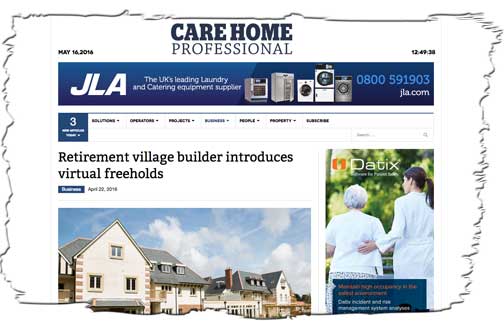 McCarthy and Stone has changed its publicity after claiming that by selling 999 year leases it was offering buyers homes that were “virtual freeholds”.
McCarthy and Stone has changed its publicity after claiming that by selling 999 year leases it was offering buyers homes that were “virtual freeholds”.
Campaign against retirement leasehold exploitation took the issue up with chief executive Clive Fenton and the over-hyped expression has been dropped from McCarthy and Stone publicity. Its website has been amended.
Last summer McCarthy and Stone decided to start offering its flats with 999 year leases. For years it had built with 125 year leases, which in the lifetime of the third or fourth owner would almost certainly need extending.
If a lease falls below 82 years it evaporates in value, much to the gain of the freehold owner – a point well appreciated by both McCarthy and Stone, which has disgraceful history of enhancing the values of its freeholds, and those who bought them.
McCarthy and Stone accepts that using the term “virtual freeholds” was over-egging the pudding.
“I understand this is a common expression to refer to long leases and it was put in speech marks to help make the point that it was not the same as formal freeholds,” explained the company’s publicity chief Paul Teveson.
“However, we do recognise that it could be confusing so we have changed ‘virtual freeholds’ to ‘999 year leases’ in the article.”
The term “virtual freehold” to describe McCarthy and Stone products has been repeated by other information sites, such as here
The Office of Fair Trading ruled in 2012 that exit fees payable on sale, which were a condition of McCarthy and Stone leases for flats built until 2008, were “likely” to be an unfair contract term.
The Law Commission is now examining the theoretical justification for exit fees, but its inquiry will not help those living in older flats which still have them.
This may help readers understand one important difference between a freehold house and a leasehold flat under English law, and why describing a lease as a “virtual freehold” is codswallop.
If you decline to pay a court established debt and you own a freehold property, it will be repossessed, the debt paid and the remainder (if any) will be returned to the former owner.
If a leaseholder – who is simply a long term tenant in law – declines to pay a court established debt, the lease will be forfeited, meaning that it ends. The former owner who put up the money, and any mortgage provider for that matter, loses their stake entirely.
This applies whether the flat is worth £140 million, as at One Hyde Park, or £30,000. And it does not matter whether the lease is one year or 999 years: if you are a leaseholder, you are a tenant.
Only England and Wales have the leasehold system, and it is a licence to print money.
On the other hand, the present generation of management at McCarthy and Stone are to be congratulated for extending leases to 999 years.
At the parliamentary roundtable last month, Sebastian O’Kelly, of Campaign against retirement leasehold exploitation, told MPs present:
“If a housebuilder in your constituency is building flats with 125 year leases and, say, £450 a year ground rents, ask why.
“125 year leases won’t catch the first buyer, or the second buyer, but almost certainly will the third or fourth.”
The high ground rents in retirement housing are also a blatant revenue enhancer for the freehold, and is done to the detriment of consumers.
























In their latest Life and Style magazine McCarthy&Stone still refer to residents as Home Owners.
Whether or not they are on long or short term leases.
They mention Home Owners and Home Owners Lounges around 30 times in just one magazine.
Sorry M&S it might have been only around 20 times
When leasehold is applied to cars, it is well understood by all parties the leaseholder does not own the car.
Probably this is because in the case of a car the agreement is for 3 years.
The only difference with property is that the lease will be for 125 years.But the principle be it 3 years for a car or 125 years for a property is exactly the same. In the case of property, you are purchasing a lease not a property.
This also makes my blood boil every time M&S advertise their new retirement properties ‘for sale’ and always use the term ‘homeowners’ many times when we all know this is NOT the case. Sadly the trading standards office sees no problem with this but I strongly disagree with them as it is clearly misleading!
Oddly, the ASA are currently running a series of adverts on commercial radio, encouraging people to report misleading adverts. So if a pack of sausages costing 99p claims to contain 48% pork, but only has a 47% pork content the ASA will act. But, give the impression that you are purchasing a flat that you own, when in fact you are purchasing a permission to occupy a flat for a set period of time that you don’t own, hence costing the vulnerable thousands of pounds, that is OK by the ASA!
I see more and more people thinking that being offered a 999 lease when buying a flat is a good thing for leaseholders and it is somehow a more honourable move from the developers involved but it’s not.
Generally now, all the very high value flats built in prime central London are done so on 999 year leases. The sole purpose of this is to completely remove the motivation for the leaseholders to get together and force the freeholder to sell them the freehold as they feel they have a ‘virtual freehold’ an Orwellian term if there ever was one.
These 999 lease are then very attractive to freeholders to buy as they can charge high ground rents with doubling clauses for the next 1000 years and can now borrow money against it from the bank. They can charge disproportionate service charges, building insurance, licensing charges and administration fees with impunity, safe in the knowledge those nasty leaseholders won’t band together to take away their golden goose. They make a fortune, can treat leaseholders even more unfairly and have the security of long term ownership, genius!
999 years leases are the very opposite of a good deal for leaseholders.
Excellent information and advice Louie which everyone should keep in mind and never forget
I was broadly in favour of a 999 year lease as a step towards a complete ending of leasehold.
Having read Louie’s superb article, I have changed my mind.
Leasehold can only ever work against the interests of leaseholders.
“Virtual freehold” should mean a long lease of 999 years term at peppercorn ground rent with RTM company responsible for building maintenance and minor duties under the lease .